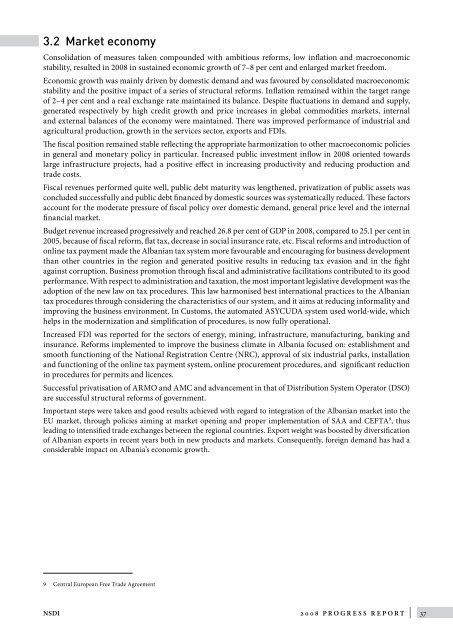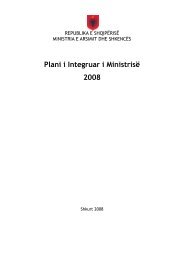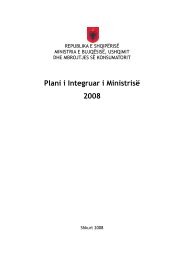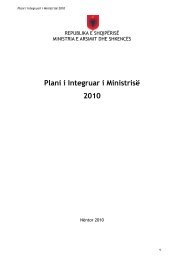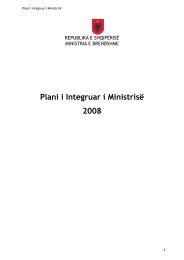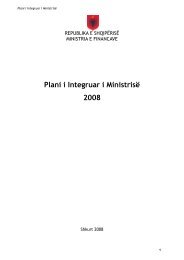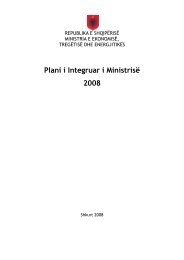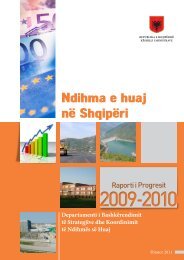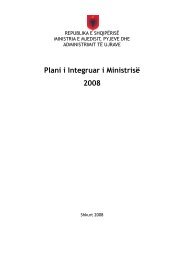Department of Strategy and Donor Coordination
Department of Strategy and Donor Coordination
Department of Strategy and Donor Coordination
You also want an ePaper? Increase the reach of your titles
YUMPU automatically turns print PDFs into web optimized ePapers that Google loves.
3.2 Market economy<br />
Consolidation <strong>of</strong> measures taken compounded with ambitious reforms, low inflation <strong>and</strong> macroeconomic<br />
stability, resulted in 2008 in sustained economic growth <strong>of</strong> 7–8 per cent <strong>and</strong> enlarged market freedom.<br />
Economic growth was mainly driven by domestic dem<strong>and</strong> <strong>and</strong> was favoured by consolidated macroeconomic<br />
stability <strong>and</strong> the positive impact <strong>of</strong> a series <strong>of</strong> structural reforms. Inflation remained within the target range<br />
<strong>of</strong> 2–4 per cent <strong>and</strong> a real exchange rate maintained its balance. Despite fluctuations in dem<strong>and</strong> <strong>and</strong> supply,<br />
generated respectively by high credit growth <strong>and</strong> price increases in global commodities markets, internal<br />
<strong>and</strong> external balances <strong>of</strong> the economy were maintained. There was improved performance <strong>of</strong> industrial <strong>and</strong><br />
agricultural production, growth in the services sector, exports <strong>and</strong> FDIs.<br />
The fiscal position remained stable reflecting the appropriate harmonization to other macroeconomic policies<br />
in general <strong>and</strong> monetary policy in particular. Increased public investment inflow in 2008 oriented towards<br />
large infrastructure projects, had a positive effect in increasing productivity <strong>and</strong> reducing production <strong>and</strong><br />
trade costs.<br />
Fiscal revenues performed quite well, public debt maturity was lengthened, privatization <strong>of</strong> public assets was<br />
concluded successfully <strong>and</strong> public debt financed by domestic sources was systematically reduced. These factors<br />
account for the moderate pressure <strong>of</strong> fiscal policy over domestic dem<strong>and</strong>, general price level <strong>and</strong> the internal<br />
financial market.<br />
Budget revenue increased progressively <strong>and</strong> reached 26.8 per cent <strong>of</strong> GDP in 2008, compared to 25.1 per cent in<br />
2005, because <strong>of</strong> fiscal reform, flat tax, decrease in social insurance rate, etc. Fiscal reforms <strong>and</strong> introduction <strong>of</strong><br />
online tax payment made the Albanian tax system more favourable <strong>and</strong> encouraging for business development<br />
than other countries in the region <strong>and</strong> generated positive results in reducing tax evasion <strong>and</strong> in the fight<br />
against corruption. Business promotion through fiscal <strong>and</strong> administrative facilitations contributed to its good<br />
performance. With respect to administration <strong>and</strong> taxation, the most important legislative development was the<br />
adoption <strong>of</strong> the new law on tax procedures. This law harmonised best international practices to the Albanian<br />
tax procedures through considering the characteristics <strong>of</strong> our system, <strong>and</strong> it aims at reducing informality <strong>and</strong><br />
improving the business environment. In Customs, the automated ASYCUDA system used world-wide, which<br />
helps in the modernization <strong>and</strong> simplification <strong>of</strong> procedures, is now fully operational.<br />
Increased FDI was reported for the sectors <strong>of</strong> energy, mining, infrastructure, manufacturing, banking <strong>and</strong><br />
insurance. Reforms implemented to improve the business climate in Albania focused on: establishment <strong>and</strong><br />
smooth functioning <strong>of</strong> the National Registration Centre (NRC), approval <strong>of</strong> six industrial parks, installation<br />
<strong>and</strong> functioning <strong>of</strong> the online tax payment system, online procurement procedures, <strong>and</strong> significant reduction<br />
in procedures for permits <strong>and</strong> licences.<br />
Successful privatisation <strong>of</strong> ARMO <strong>and</strong> AMC <strong>and</strong> advancement in that <strong>of</strong> Distribution System Operator (DSO)<br />
are successful structural reforms <strong>of</strong> government.<br />
Important steps were taken <strong>and</strong> good results achieved with regard to integration <strong>of</strong> the Albanian market into the<br />
EU market, through policies aiming at market opening <strong>and</strong> proper implementation <strong>of</strong> SAA <strong>and</strong> CEFTA 9 , thus<br />
leading to intensified trade exchanges between the regional countries. Export weight was boosted by diversification<br />
<strong>of</strong> Albanian exports in recent years both in new products <strong>and</strong> markets. Consequently, foreign dem<strong>and</strong> has had a<br />
considerable impact on Albania’s economic growth.<br />
9 Central European Free Trade Agreement<br />
NSDI 2008 Progress Report | 37


